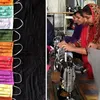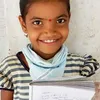How women self-help groups became part of the fight against COVID-19 in India
Women SHGs across India, amidst the pandemic, have been providing masks, sanitisers, cooked meals, and more, to help the distressed. Here’s how these women did it.
At the time the first nationwide lockdown was announced by the Government of India due to the rising coronavirus cases, the country witnessed a dearth in masks and sanitisers caused due to panic buying and confusion.
On the other hand, millions of Indians had started migrating back home after losing their livelihoods in big cities. Amidst all this, hundreds of Self-Help Groups (SHGs) across India rose to the occasion to help the country fight the pandemic, and also employ people who lost their jobs.
As per a report by the Ministry of Rural Development, over 132 lakh masks were produced by 14,522 SHGs, involving 65,936 members in 399 districts (across 27 states) from March 15 to March 30.

Women received training and awareness about COVID-19 through WhatsApp groups
In the following months, over two lakh women had been involved in producing close to 10 crore masks across 27 Indian states. In fact, they have also helped in the production of over three lakh litres of sanitiser, and about 50,000 litres of handwash.
SHGs and collectives in India are supported by the National Rural Livelihoods Mission (NRLM). Launched in 2011, the NRLM has scaled the SHG model to about 28 Indian states and 6 UTs, reaching out to over 67 million people.
SocialStory interacted with SHGs, cooperatives, collectives, and organisations to understand the efforts put by millions of people in this informal employment sector.
Meeting the essential shortfall
SEWA (Self-Employed Women’s Association) works primarily to help informal workers with livelihoods, who have been side-lined from the mainstream economy and digitalisation. It was originally started as a women’s trade union in 1972 in Gujarat by Ela Bhatt.
The organisation, in association with SEWA Ruaab — an artisan producer company —is helping women make masks, herbal sanitisers, herbal soaps, PPE kits, shoe mitts, gloves, scarfs, and caps.
“For the same, we partnered with NITI Aayog, which was instrumental in getting us several large-scale orders that a small group could not have managed otherwise. This was a huge source of stable income for these women during the lockdown,” says Nitya Nangalia, Coordinator of social enterprises at SEWA Bharat.

Representational image
Meanwhile, PRADAN (Professional Assistance for Development Action), a non-governmental organisation that is actively working to solve the rural poverty of India, also worked closely with women groups to train them in the different aspects necessitated by the pandemic. It was started by Deep Joshi and Vijay Mahajan in 1982.
PRADAN works in the mineral-rich Deccan Plateau region, where despite such abundance, many families do not have a livelihood and enough food to last a year, says Madhu Khetan, Programme Director, PRADAN.
She continues, “Most of the SHGs did not depend on tailoring for their livelihood in the pre-pandemic times. However, they rose to the occasion to stitch masks and make up for the increasing dearth.”
Thanks to the training sessions, these SHGs became proactive in making masks, sanitisers, handwash, and PPE kits, irrespective of their primary skillset.
While production was in place, the lockdown posed restrictions on transportation. For this reason, the SHG workers voluntarily stepped out to distribute these kits. Rajasthan resident Jehra Bibi of Nari Shakti Mahila Sangh (an SHG associated with PRADAN) is one among them.
She says, “Being the President of the federation, it was my responsibility to support the administration during this crisis. So, I stepped out, and helped them to distribute ration and safety equipment to the vulnerable people."
Creating COVID-19 awareness
“While women were not technology savvy before, the situation has made them familiarise with WhatsApp and conference calls as the primary medium of training and awareness,” says Salonie Hiriyur, Senior Coordinator, SEWA Cooperative Federation.
Megha Mandali is a cooperative of 1,000 tribal women farmers in Tapi district in southern Gujarat. A member of the SEWA Cooperative Foundation, it works in the agricultural sector, providing sustainable and organic farming training to farmers.
During the lockdown, the cooperative conducted WhatsApp training sessions for its members (most of them who are first-time mobile users) on the precautions taken during the pandemic, taking care of older people, gender-based violence, and mental health.

Creating awareness about the coronavirus
“Initially, there was some confusion about the digital medium. So, we started with five women first, but slowly reeled in more women once they were getting comfortable with the platform,” says Lataben, President of Megha Mandali.
Another member of the cooperative, Namrataben says, “We had 50 master trainers, who trained about 20 people each, and each of those 20 people further trained about a hundred women each. We approximately trained about 36,000 women.”
Banking and insurance
In 2009, in a bid to make women financially independent, SEWA Bharat started the SEWA-SBI business correspondent model, in association with the State Bank of India.
The model identifies and employs local women as banking agents, and gives them the technical capacity to bring banking services to previously unbanked areas. Under this, each agent serves as a Customer Service Point (CSP) in a cluster (an area of operation defined by the bank, covering two or more villages).

SEWA Sarthak in session
The model — which was formally registered as SEWA Sarthak Pvt. Ltd. in 2015 — helped people open 75,000 savings accounts, deposit more than Rs 60 crore in fixed deposit accounts, and disbursed loans worth Rs 26 crore.
Since people were afraid to step out amidst the pandemic, and banks situated far away, people, who wanted to withdraw money to ensure some financial security, were left in a difficult situation.
These agents went from door-to-door, assisting the distressed people. In fact, some agents even put money from their own pockets to activate some of the accounts.
“People in rural areas did not have active accounts in that area, so to help them withdraw money, we helped activate their bank and MGNREGA accounts. We also helped them fulfil the KYC requirements,” says Jayantiben, a CSP agent working with SEWA Sarthak.
VimoSEWA — an insurance cooperative of SEWA Bharat — developed COVID-19 insurance to help the rural communities, which covered the hospital costs and the post-COVID charges.
Community kitchens
Apart from distributing essential kits, many SHGs across India were involved in operating community kitchens as well. Kudumbashree Network, which links over 4.4 million women across 300,000 SHGs in Kerala, is one such organisation.
Through 1,300 community kitchens in various panchayats and municipalities in Kerala, these women cooked and distributed fresh meals to the vulnerable groups, as well as to those who are bedridden and under quarantine.
In Jharkhand, SHGs have joined hands with their respective district administration to eradicate hunger and starvation among the underprivileged. It delivered rations to underprivileged families, and also operated a helpline for returning migrants.
SEWA Sangini runs nearly 11 child care centres in Ahmedabad. However, the pandemic forced these centres along with the Anganwadi centres to shutdown.
“Despite the hardships, our women collectives around the area took the initiative to cook and serve hot food to children in the initial days of the lockdown to sustain their nutrition,” says Salonie.
The efforts of these women working in SHGs have been noteworthy in the fight against the pandemic, where they are not only sustaining themselves but are helping the economy to kickstart.
Edited by Suman Singh









